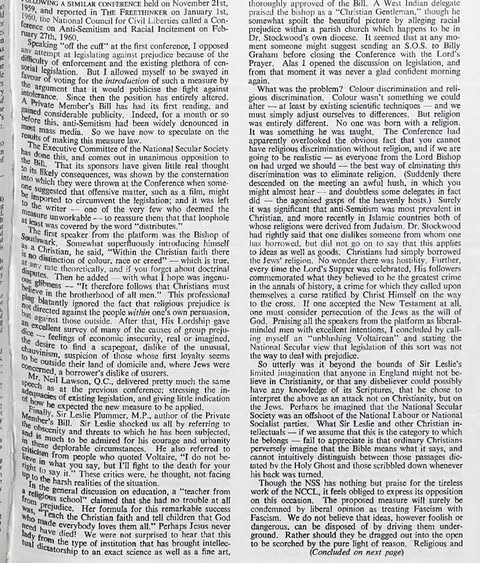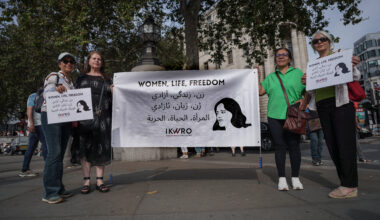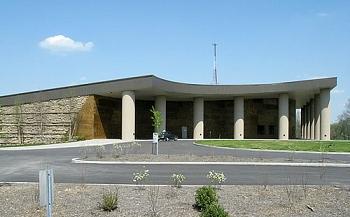Reproduced below is an evergreen article by David Tribe arguing the case for free speech in the context of proposed (and, in the end, unsuccessful) anti-prejudice legislation. Though it was published in 1960, and conditions are very different in many ways in 2025, this article would require just a little bit of updating to be totally applicable today. The arguments over free speech, hate speech, racism, blasphemy, and the rest should all be very familiar to anyone even glancingly acquainted with the news these days. (The final paragraph in particular is very relevant in today’s context of proposed anti-‘Islamophobia’ legislation and a man being prosecuted for burning a Qur’an.)
I think Tribe, a former Freethinker editor, provides an incisive critique of attempts to curb free speech even with the best of intentions. Thus, and with only minor formatting changes, here is Tribe’s article. Note that the piece was published when the National Secular Society (NSS) and the Freethinker were almost one and the same, with the latter operating more or less as an organ of the former. Below, you can find some more recent Freethinker pieces dealing with similar issues.
Following a similar conference held on November 21st, 1959, and reported in The Freethinker on January 1st, 1960, the National Council for Civil Liberties [NCCL] called a Conference on Anti-Semitism and Racial Incitement on February 27th, 1960.
Speaking “off the cuff” at the first conference, I opposed any attempt at legislating against prejudice because of the difficulty of enforcement and the existing plethora of censorial legislation. But I allowed myself to be swayed in favour of voting for the introduction of such a measure by the argument that it would publicise the fight against intolerance. Since then the position has entirely altered. A Private Member’s Bill has had its first reading, and gained considerable publicity. Indeed, for a month or so before this, anti-Semitism had been widely denounced in most mass media. So we have now to speculate on the results of making this measure law.
The Executive Committee of the National Secular Society has done this, and comes out in unanimous opposition to the Bill. That its sponsors have given little real thought to its likely consequences, was shown by the consternation into which they were thrown at the Conference when someone suggested that offensive matter, such as a film, might be imported to circumvent the legislation; and it was left to the writer—one of the very few who deemed the measure unworkable—to reassure them that that loophole at least was covered by the word “distributes.”
The first speaker from the platform was the Bishop of Southwark. Somewhat superfluously introducing himself as a Christian, he said, “Within the Christian faith there is no distinction of colour, race or creed”—which is true, at any rate theoretically, and if you forget about doctrinal disputes. Then he added—with what I hope was ingenuous glibness—”It therefore follows that Christians must believe in the brotherhood of all men.” This professional plug blatantly ignored the fact that religious prejudice is not directed against the people within one’s own persuasion, but against those outside. After that, His Lordship gave an excellent survey of many of the causes of group prejudice—feelings of economic insecurity, real or imagined, the desire to find a scapegoat, dislike of the unusual, chauvinism, suspicion of those whose first loyalty seems to be outside their land of domicile and, where Jews were concerned, a borrower’s dislike of usurers.
Mr. Neil Lawson, Q.C., delivered pretty much the same speech as at the previous conference: stressing the inadequacies of existing legislation, and giving little indication of how he expected the new measure to be applied.
Finally, Sir Leslie Plummer, M.P., author of the Private Member’s Bill. Sir Leslie shocked us all by referring to the obscenity and threats to which he has been subjected, and is much to be admired for his courage and urbanity in these deplorable circumstances. He also referred to criticism from people who quoted Voltaire. “I do not believe in what you say, but I’ll fight to the death for your right to say it.” These critics were, he thought, not facing up to the harsh realities of the situation.
In the general discussion on education, a “teacher from a religious school” claimed that she had no trouble at all from prejudice. Her formula for this remarkable success was, “Teach the Christian faith and tell children that God who made everybody loves them all.” Perhaps Jesus never need have died! We were not surprised to hear that this lady from the type of institution that has brought intellectual dictatorship to an exact science as well as a fine art, thoroughly approved of the Bill.1 A West Indian delegate praised the bishop as a “Christian Gentleman,” though he somewhat spoilt the beautiful picture by alleging racial prejudice within a parish church which happens to be in Dr. Stockwood’s own diocese. It seemed that at any moment someone might suggest sending an S.O.S. to Billy Graham before closing the Conference with the Lord’s Prayer. Alas I opened the discussion on legislation, and from that moment it was never a glad confident morning again.
What was the problem? Colour discrimination and religious discrimination. Colour wasn’t something we could alter—at least by existing scientific techniques—and we must simply adjust ourselves to differences. But religion was entirely different. No one was born with a religion. It was something he was taught. The Conference had apparently overlooked the obvious fact that you cannot have religious discrimination without religion, and if we are going to be realistic—as everyone from the Lord Bishop on had urged we should—the best way of eliminating this discrimination was to eliminate religion. (Suddenly there descended on the meeting an awful hush, in which you might almost hear—and doubtless some delegates in fact did—the agonised gasps of the heavenly hosts.) Surely it was significant that anti-Semitism was most prevalent in Christian, and more recently in Islamic countries, both of whose religions were derived from Judaism. Dr. Stockwood had rightly said that one dislikes someone from whom one has borrowed, but did not go on to say that this applies to ideas as well as goods. Christians had simply borrowed the Jews’ religion. No wonder there was hostility. Further, every time the Lord’s Supper was celebrated, His followers commemorated what they believed to be the greatest crime in the annals of history, a crime for which they called upon themselves a curse ratified by Christ Himself on the way to the cross. If one accepted the New Testament at all, one must consider persecution of the Jews as the will of God. Praising all the speakers from the platform as liberal-minded men with excellent intentions, I concluded by calling myself an “unblushing Voltairean” and stating the National Secular view that legislation of this sort was not the way to deal with prejudice.
So utterly was it beyond the bounds of Sir Leslie’s limited imagination that anyone in England might not believe in Christianity, or that any disbeliever could possibly have any knowledge of its Scriptures, that he chose to interpret the above as an attack not on Christianity, but on the Jews. Perhaps he imagined that the National Secular Society was an offshoot of the National Labour or National Socialist parties. What Sir Leslie and other Christian intellectuals—if we assume that this is the category to which he belongs—fail to appreciate is that ordinary Christians perversely imagine that the Bible means what it says, and cannot intuitively distinguish between those passages dictated by the Holy Ghost and those scribbled down whenever his back was turned.
Though the NSS has nothing but praise for the tireless work of the NCCL, it feels obliged to express its opposition on this occasion. The proposed measure will surely be condemned by liberal opinion as treating Fascism with Fascism. We do not believe that ideas, however foolish or dangerous, can be disposed of by driving them underground. Rather should they be dragged out into the open to be scorched by the pure light of reason. Religious and race dogmatists have a case to put. It is, in our opinion, a false, indeed a revolting one. But we shall be creating a very dangerous precedent if we deny them the right to put it.
As for tangible instances of persecution, we already have laws against sedition, murder—ritual or otherwise—assault, threats of physical violence, behaviour likely to lead to a breach of the peace, libel, and so on. Intangibles will be just as difficult to pursue by any new as by any old legislation, and every act that is unenforceable serves only to bring law itself into disrepute. But even if the proposed measure were really operable, would it replace prejudice with harmony? If a landlady could be forced to admit someone she didn’t want, would she not find a thousand and one ways of making life intolerable for the tenant? At least a discriminatory advertisement can be useful to coloureds and liberal whites alike as indicating the sort of place best to avoid. The fight against prejudice is to be waged not in the courtroom but in the classroom. Repressive legislation could become a remedy worse than the disease. It was well within the bounds of possibility that “any written matter or illustration insulting to any person or persons because of their race or religion” could be held to include an attack on religion, if any devotee claimed that he found this personally insulting. The free criticism of ideas and institutions would then be undermined, and we should find ourselves well on the road to totalitarianism. A healthy society is untroubled by the carpings of prejudice—just as the South Africa Boycott meeting on February 28th in London ignored Mosley’s leaflets and lorries—knowing that hatred does most harm to the hater. If our children are nurtured in world brotherhood, discrimination will start to disappear. If they are not, legislation of this sort will be worse than useless.
More from the Freethinker on free speech, hate speech, etc:
Secularism and the struggle for free speech, by Stephen Evans
Free speech in Britain: a losing battle? by Porcus Sapiens
10 years since the Charlie Hebdo attack: a message from the Freethinker, by Daniel James Sharp
On trial for blasphemy: the Freethinker’s first editor and offensive cartoons, by Bob Forder
‘The best way to combat bad speech is with good speech’ – interview with Maryam Namazie, by Emma Park
The return of blasphemy in Ireland, by Noel Yaxley
Blasphemy and bishops: how secularists are navigating the culture wars, by Emma Park
Salwan Momika and the right to burn books, by Noel Yaxley
Storm over a tea-cup? The ‘Mug-Gate’ teacher speaks out, by Matt Lovell
The problem with ‘Islamophobia’, by Mark Lilly
Kant vs Tahir Ali: why desecration should not be outlawed, by Daniel Herbert
The return of non-crime hate incidents: tyranny back on the march, by Noel Yaxley
Blasphemy and violence: review of ‘Demystifying the Sacred’, by Adam Wakeling
Three years on, the lessons of Batley are yet to be learned, by Jack Rivington
From Satan to the Hate Monster, by Emma Park
Milton’s ‘Areopagitica’: liberty and licensing, by Tony Howe
Cancel culture and religious intolerance: ‘Falsely Accused of Islamophobia’, by Steven Greer, by Daniel James Sharp
The perils of dropping a book, by Noel Yaxley
Is the spirit of liberty dead in Scotland? by Noel Yaxley
Britain’s blasphemy heritage, by David Nash
The Satanic Verses; free speech in the Freethinker, by Emma Park
Free speech at universities: where do we go from here? by Julius Weinberg
Free speech and the ‘Farage riots’, by Noel Yaxley
What’s Happened to Free Speech? Musings of a Troubled Freethinker, by Bob Forder
- Editor: A good point to bear in mind today, when many Christians are complaining of persecution and jumping on the free speech bandwagon. Never forget that had they the power, they would happily assert their faith using the resources of the state. Ironic also that Christians such as the ones described above were often in the vanguard of attempts to shut down free speech in the name of ‘tolerance’. When they moan about the godless, ‘woke’ left, remind them of this fact. (All of which is not to deny that many Christians genuinely are pro-free speech. And, of course, Christians’ rights should also be vociferously and unapologetically defended by secularists, so long as they are actually affirming genuine rights—rather than claims to privilege.) ↩︎









Your email address will not be published. Comments are subject to our Community Guidelines. Required fields are marked *
Donate